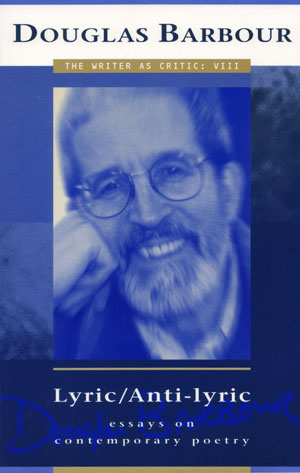


[Lyric / Anti-lyric] provides us with [a] searching inquiry into the tensions and aesthetics of combining personal expression and critical commentary. In his preface, “Confessions of a 'Formalist,'” Barbour defines himself as “a practicing poet [. . .] writing about the work of poets” he admires. He, like Bowering and many other contemporaries, expresses an allegiance to “form,” to words, rhythms, and the “body” of literature; he is at home with “modern art, and with abstract art, especially with art [. . .] that most displays itself as a 'work' of art, in terms of the actual working that went into its making.” Barbour's “lyric / anti-lyric” sensibility values the formal movement of language most when it in some way announces the circumstances of its composition. . . . Barbour finds himself - and other contemporary poets - endlessly attracted to “the idea of lyric” and to its opposite, to “mining” and “undermining” the conventions of lyricism. . . . Each chapter offers a carefully crafted reading, one sensitive to each poet's aesthetics and work, yet, where appropriate, ready to draw out the lyric / anti-lyric elements. Professing a “genial eclecticism,” Barbour nonetheless presents a remarkably coherent, consistently clear and engaging discussion of both the individual poets and their shared fascination with the lure and limits of lyricism. The essays on Webb, Nichol, and Kiyooka are exemplary in this respect, offering deep poetic insight while maintaining a spirit of critical modesty, detachment, and honesty. Barbour represents himself as both poet and critic, and, in the process, embodies an important aspect of the lyric / anti-lyric dynamic. —W.F. Garrett-Petts Canadian Literature |
